Related Research Articles

In Greek mythology, Hector is a Trojan prince, a hero and the greatest warrior for Troy during the Trojan War. He is a major character in Homer's Iliad, where he leads the Trojans and their allies in the defense of Troy, killing countless Greek warriors. He is ultimately killed in single combat by the Greek hero Achilles, who later drags his dead body around the city of Troy behind his chariot.

In Greek mythology, Priam was the legendary and last king of Troy during the Trojan War. He was the son of Laomedon. His many children included notable characters such as Hector, Paris, and Cassandra.

The Trojan War was a legendary conflict in Greek mythology that took place around the 12th or 13th century BC. The war was waged by the Achaeans (Greeks) against the city of Troy after Paris of Troy took Helen from her husband Menelaus, king of Sparta. The war is one of the most important events in Greek mythology, and it has been narrated through many works of Greek literature, most notably Homer's Iliad. The core of the Iliad describes a period of four days and two nights in the tenth year of the decade-long siege of Troy; the Odyssey describes the journey home of Odysseus, one of the war's heroes. Other parts of the war are described in a cycle of epic poems, which have survived through fragments. Episodes from the war provided material for Greek tragedy and other works of Greek literature, and for Roman poets including Virgil and Ovid.
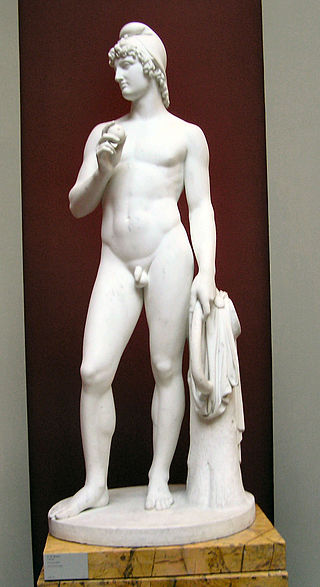
Paris, also known as Alexander, is a mythological figure in the story of the Trojan War. He appears in numerous Greek legends and works of Ancient Greek literature such as the Iliad. In myth, he is prince of Troy, son of King Priam and Queen Hecuba, and younger brother of Prince Hector. His elopement with Helen sparks the Trojan War, during which he fatally wounds Achilles.
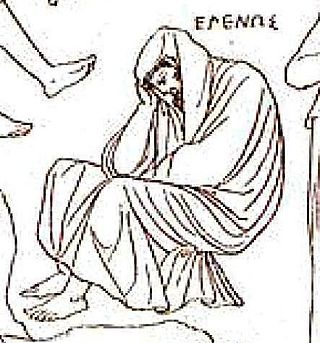
In Greek mythology, Helenus was a gentle and clever seer. He was also a Trojan prince as the son of King Priam and Queen Hecuba of Troy, and the twin brother of the prophetess Cassandra.

In Greek mythology, Neoptolemus, originally called Pyrrhus at birth, was the son of the mythical warrior Achilles and the princess Deidamia, and the brother of Oneiros. He became the progenitor of the ruling dynasty of the Molossians of ancient Epirus. In a reference to his pedigree, Neoptolemus was sometimes called Achillides or, from his grandfather's or great-grandfather's names, Pelides or Aeacides.

In Greek mythology, Andromache was the wife of Hector, daughter of Eetion, and sister to Podes. She was born and raised in the city of Cilician Thebe, over which her father ruled. The name means 'man battler' or 'fighter of men' or 'man fighter' or 'man's battle', from the Greek stem ἀνδρ- 'man' and μάχη 'battle'.
In Greek mythology, Deiphobus was a son of Priam and Hecuba. He was a prince of Troy, and the greatest of Priam's sons after Hector and Paris. Deiphobus killed four men of fame in the Trojan War.

Troy is a 2004 epic historical war film directed by Wolfgang Petersen and written by David Benioff. Produced by units in Malta, Mexico and Britain's Shepperton Studios, the film features an ensemble cast led by Brad Pitt, Eric Bana, Sean Bean, Diane Kruger, Brian Cox, Brendan Gleeson, Rose Byrne, Saffron Burrows and Orlando Bloom. It is loosely based on Homer's Iliad in its narration of the entire story of the decade-long Trojan War—condensed into little more than a couple of weeks, rather than just the quarrel between Achilles and Agamemnon in the ninth year. Achilles leads his Myrmidons along with the rest of the Greek army invading the historical city of Troy, defended by Hector's Trojan army. The end of the film is not taken from the Iliad, but rather from Quintus Smyrnaeus's Posthomerica, as the Iliad concludes with Hector's death and funeral.

In Greek antiquity, Hermione was the daughter of Menelaus, king of Sparta, and his wife, Helen of Troy. Prior to the Trojan War, Hermione had been betrothed by Tyndareus, her grandfather, to her cousin Orestes, son of her uncle, Agamemnon. She was just nine years old when Paris, son of the Trojan king Priam, arrived to abduct her mother, Helen.
Paris is a rock musical written by Australian rock musician Jon English and David Mackay between 1987 and 1990, based on the myth of the Trojan War. A concept album was released in Australia in 1990 with the first stage production taking place in Sydney in 2003.
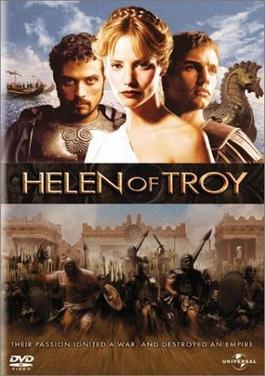
Helen of Troy is a 2003 British-American television miniseries based upon Homer's story of the Trojan War, as recounted in the epic poem, the Iliad.

There are a wide range of ways in which people have represented the Trojan War in literature and the arts.
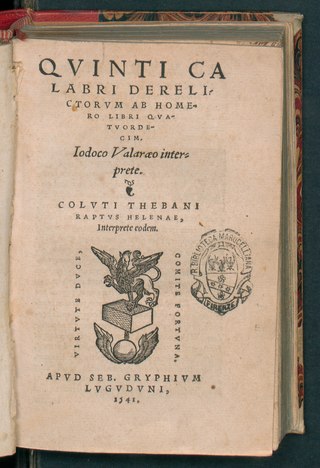
The Posthomerica is an epic poem in Greek hexameter verse by Quintus of Smyrna. Probably written in the 3rd century AD, it tells the story of the Trojan War, between the death of Hector and the fall of Ilium (Troy). The poem is an abridgement of the events described in the epic poems Aethiopis and Iliou Persis by Arctinus of Miletus, and the Little Iliad by Lesches, all now-lost poems of the Epic Cycle.

Goddess of Yesterday is a 2002 novel by Caroline B. Cooney based on the Trojan War from Greek mythology. The book was nominated for the South Carolina Junior Book Award, and was a 2003 ALA Notable Children's Book for Older Readers
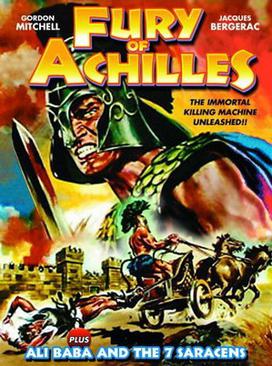
L'ira di Achille, internationally released as The Fury of Achilles, is a 1962 Italian historical drama set in the ninth year of the Trojan War and is based primarily on Homer's Iliad. The film was directed by Marino Girolami and starred Gordon Mitchell as Achilles. It was released in the UK in 1963 as ACHILLES and was filmed in EuroScope and Eastman Color.

Troades is a fabula crepidata of c. 1179 lines of verse written by Lucius Annaeus Seneca.

The Tragedy of Troilus and Cressida, often shortened to Troilus and Cressida ), is a play by William Shakespeare, probably written in 1602.
The Destruction of Troy is a 1678 tragedy by the English writer John Banks. It was first staged by the Duke's Company at the Dorset Garden Theatre in London. It depicts the Trojan War as inspired by Homer's Iliad.
References
- ↑ Porter, Andrew, "Michael Tippett's New Opera" (July 1962). The Musical Times, 103 (1433): pp. 469-470.
- ↑ 'Tippett's King Priam on a German Stage' in The Times, 30 January 1963, p. 13
- ↑ English Touring Opera Programme, Spring 2014, p. 12.
- ↑ Essay Die Bilder (in German) on Arnold Schoenberg Centre website, accessed 23.2.2014.
- ↑ Macdonald, Hugh R.N., "Recordings - Tippett: King Priam (June 1982). Tempo (New Ser.), 141: pp. 42-43.
- ↑ Rimer, Thomas (1983). "King Priam. Michael Tippett". The Opera Quarterly. 1 (2): 166–167. doi:10.1093/oq/1.2.166.